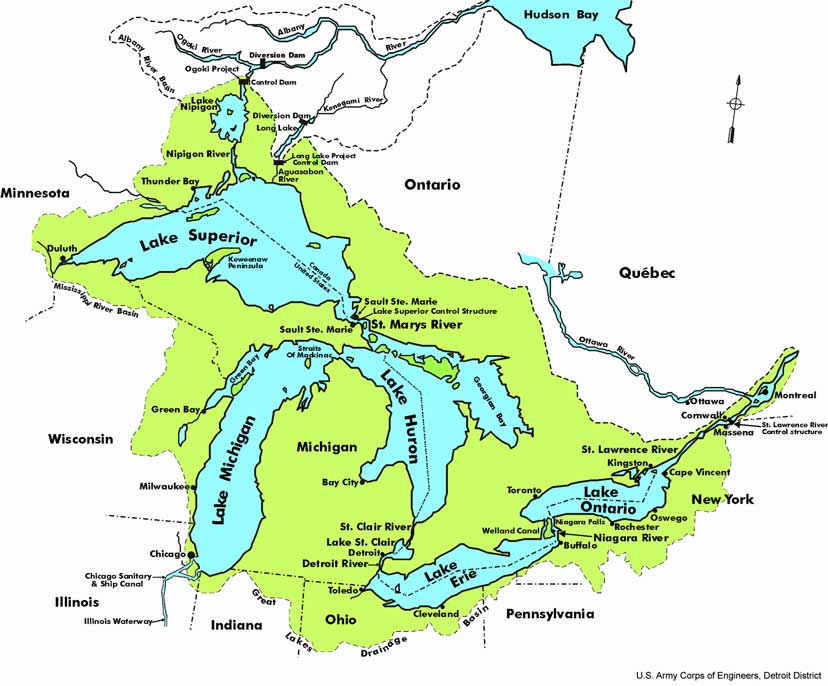Second recent assault on lakes could be precedent-setting move
WISCONSIN—It was close, but last week, on the last day for possible objection, the environmental law organization Midwest Environmental Advocates (MEA) in Madison, Wisconsin filed a legal challenge to Racine, Wisconsin’s request to divert seven million gallons a day out of the Great Lakes Basin. This is the second ask of the Great Lakes state to divert millions of gallons away from the Great Lakes.
Racine wants the water to supply a factory under development by Taiwanese electronic display manufacturer Foxconn to make LCD display screens. Almost all of the factory’s site lies outside the Great Lakes Basin, and so the diversion would seem to be in violation of the Great Lakes Compact. The Compact is a deal inked in 2008 between the eight Great Lakes states with representation from the provinces of Ontario and Quebec.
Wisconsin aggressively courted Foxconn as the Racine region is suffering from large unemployment rates, offering $3 billion in incentives to the Taiwanese company and exempting the plant from an environmental impact review and its wetlands regulations.
In spite of objections by citizens, environmental organizations, the Great Lakes and St. Lawrence Cities Initiative and the states of New York and Illinois, the Wisconsin Department of Natural Resources (DNR) approved the diversion request last April. “This is not surprising in that the DNR has been stripped of its scientists and its mission of science-based permitting by ‘tea party’ governor Scott Walker,” said Jim Nies, a seasonal resident of Kagawong who hails from Wisconsin. Mr. Nies is a member of the Manitoulin contingent of the Great Lakes Islands Coalition and the Manitoulin Area Stewardship Committee.
MEA says that its legal challenge was “essential, as Wisconsin’s approval of the Lake Michigan water diversion requested by Racine tests the integrity of the Great Lakes Compact by ignoring a key requirement of the historic agreement entered into by the eight Great Lakes states and enacted into federal law. This mistake must be corrected to defend the Great Lakes Compact and to protect our magnificent Great Lakes in the near and distant future.”
The majority of the seven million gallons of water requested for transfer out of the basin will be used to supply Lake Michigan water to one single private industrial customer, Foxconn. Seven million gallons, however, is not enough of a draw to trigger a review from the rest of the Compact states. (In comparison, the city of Chicago uses 700 million gallons of Lake Michigan water every day in accordance with an agreement more than a century old. The Chicago diversion, however, is within the Great Lakes Basin.)
The MEA legal challenge says that “the Wisconsin DNR disregarded and unreasonably interpreted a core Compact requirement that all water transferred out of the Great Lakes Basin must be used for public water supply purposes, clearly defined as ‘serving a group of largely residential customers.”
“I am grateful that Midwest Environmental Advocates has challenged the Foxconn diversion request,” Mr. Nies said. “I think the residents of Manitoulin, and Ontario, should also be appreciative and supportive. Water diverted out of Lake Michigan is also water diverted out of Lake Huron. And the Compact, designed to prevent diversions, is only effective if it is enforced and protected.”
“Two years ago, the Ontario government went meekly along with the approval of the Waukesha, Wisconsin diversion,” Mr. Nies added. “I tend to think it’s unreasonable to expect much future diversion opposition coming from Ontario’s Ministry of Natural Resources and Forestry (MNRF). Although there should be.” The Waukesha diversion sought to take 10 million gallons of Lake Michigan water a day to provide water for the Waukesha region, whose water has high levels of radium, a carcinogen.
“Peter Annin, the author of ‘Great Lakes Water Wars,’ is working on a new edition of his book and he foresees continued and intensified demand for Great Lakes water as the warming climate intensifies the west’s great thirst,” he continued. “If a Trans Mountain pipeline can be built to transport oil, certainly a mid-continent pipeline could be built to transport water from Lake Superior to Arizona.”
The Compact is a bulwark against diversions, but it’s a fragile one, Mr. Nies said. “Thank goodness for Midwest Environmental Advocates. Perhaps it would be prudent for the people of Ontario to send a little support their way.”





